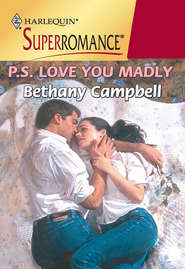По всем вопросам обращайтесь на: info@litportal.ru
(©) 2003-2025.
✖
One True Secret
Автор
Год написания книги
2018
Настройки чтения
Размер шрифта
Высота строк
Поля
A knock sounded at the library door. Emerson looked up from her magazine, her face brightening. She recognized that delicate knock; it was Nana’s.
“Come in,” she called. The door opened, and her grandmother entered.
Lela Roth was a tiny woman, seventy-three years old. Her hair, once ink-black, was now dark gray, and she wore it in one long braid down her back. Her black eyes, large and thickly lashed, were her most striking feature, and Emerson had inherited them.
Lela’s back was still straight, her movements slow but sure. She spoke with an accent, for she had been raised in Paris. Nathan had always teased that he’d kidnapped her from her strict father and made her his child bride. She was ten years younger than her husband.
“I thought I would find you here.” Nana moved to Emerson’s side and kissed her on the cheek. “What are you doing?”
Emerson kissed her back, then waggled her magazine. “My homework.”
“Phaa!” said Nana. “You’re reading things by that man, that Garner person.”
“It’s important to know your enemy.” Emerson rose, gesturing for Nana to take the armchair.
“You do not have much time to learn about him,” Nana said, sitting. “He and the photographe arrive in an hour. Your sister is going crazy.”
Emerson cleared the ottoman and sat by Nana’s feet. “My sister’s an alarmist.”
“I’m a bit alarmed myself.” Nana shook her head.
“You’re sure it’s wise to do this?”
“I’m sure.” Emerson took the toe of her grandmother’s embroidered slipper and squeezed it playfully. “How’s the Captain?”
“As usual,” Nana said with an expressive shrug. “I’ve been sitting with him.”
“How’s the painting going?”
“It goes well, I think.” Nana frowned slightly. She had been a great beauty in her day, and now she was an elderly beauty. Even her frown was becoming. It had style.
She tilted her head and gave Emerson a stern look. “But you’re changing the subject on me. This man, Garner. This is how you get ready for him? Only looking at magazines? Again?”
“By their works ye shall know them.”
Nana tapped her foot scornfully on a copy of Mondragon. “He is like le requin. The shark. From a distance I admire his strength. But close I do not want to see him. I do not want his sharp teeth going snap-snap at me and my family.”
Emerson took her grandmother’s gnarled hand gently between her own. Age had been kind to the older woman except for her hands. Arthritis had swollen and bent her fingers. “Nana, Mondragon gave us a choice. They’ll do the story with our cooperation. Or without it. We have far more control if we cooperate. Or seem to.”
Nana tapped a forefinger to her temple. “This Garner man, he is smart. I have read him. And he is hard. He has moved among criminals, masters of deception. You truly think you are his equal?”
Emerson smiled. “Why shouldn’t I be? I have the Captain’s blood in my veins. And yours, too.”
Slowly, the older woman smiled back. She reached out and smoothed Emerson’s long hair. “Ahh. Yes. But be careful. I have seen his picture. He is handsome. That is another weapon. He will not be above using it. Apel du sex.”
“Sex appeal?” Emerson’s eyes lit with mischief. “Two can play that game.”
Nana threw her head back and laughed. Then she grew serious. She gave Emerson a critical look. “You’re not wearing that, are you?”
Emerson wore very short red shorts and a white T-shirt without a bra beneath. “No. I thought the little white sun dress. With the low neck.”
Nana’s scowl was elegant in its disdain. She waved her hand in admonition. “Non, non, non. So obvious! Be subtle. The blue caftan. With the sleeves that flow. Cover yourself. It is much more provocative. Shouldn’t I know?”
With that, she got up and walked toward the door.
Emerson frowned. “I can’t. The caftan has a spot on it.” It did, a small but dark stain on the bosom.
“All the better,” Nana said loftily. “It will look less studied.”
With that, she was out the door and was gone.
Emerson rolled her eyes, thinking, I will not wear something with a spot on it. Why it’d look as if I didn’t care a bit what impression I made—
But then she grinned. “Damn,” she said softly. “She’s right. Exactly.”
WHEN IN THE TROPICS, rent a convertible and don Ray•Bans; this was Eli’s philosophy. Except, of course, in certain parts of the tropics, where it was more prudent to rent a Humvee and wear Kevlar.
He drove north, up Highway 1, while Merriman stared at a map of the Keys in perplexity.
“How many of these islands are there?”
“Around eight hundred or so.”
Merriman shot him a disbelieving look. “Get real. There aren’t eight hundred on this map. No way.”
“A lot are too small to chart. Only about thirty are inhabited.”
Merriman looked at the map again, frowning. The Keys stretched 120 miles from Key Largo, the northernmost, to Key West, the farthest south. “There’s only this one highway connecting them? That’s it?”
“That’s it,” Eli said. “One highway in and out.”
The convertible, a red Chrysler, was crossing a long bridge. Merriman grimaced uneasily. “These damn bridges go over the ocean, man.”
“Right.” Eli nodded calmly. “The Overseas Highway. Forty-two bridges. Great feat of engineering.”
Merriman was unimpressed by the great feat. “What if there’s a wreck or a traffic jam or something?”
“You’re stuck.”
“What if a bridge collapses? Or washes out?”
Eli shrugged. “Same thing. You’re stuck.”
Merriman’s expression became a bit queasy. “At breakfast I heard people talking about a hurricane warning.”
“Tropical storm. It was downgraded.”
“Technicalities,” Merriman grumbled. “I heard the word evacuation. That this thing might hit the Lower Keys.”











